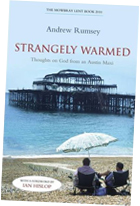| |
|
|
| Into the mystic |
 |
September 2001
It could be the onset either of autumn or indigestion, but there are stirrings within. Like my rather troublesome alimentary canal, this periodic growling of the soul is, in part at least, an inherited phenomenon; signalling as it does my family's uneasy relationship with things monastic and mystical.
An episode from Rumsey folklore may help explain what I'm getting at. It features my late father at Paddington station sometime in the mid-1950s. Having absconded from the monastery which he had rashly entered some months earlier, he was pursued cross-country from Dorset by the Abbot; confronted on the smog-laden (in my romantic imagining, at least) platform and piously pressed to re-consider. His efforts, it will be clear from the existence of your columnist, came to no avail...
This brief encounter – sadly unpreserved on film – is one of several I could pluck from the archives to illustrate how withdrawing from the world both attracts and repels many of us. There are certain times, of course, when a life of contemplation seems both attainable and desirable: during a hot bath, for example, or before tackling a large and unpleasant task such as re-papering the hallway.
These can, I find, induce a most earnest desire to empty oneself of all activity and simply be. There are many other times, however, when the deep things of the soul seem as improbable and unsettling as those TV documentaries on the mutant and murky life of the seabed. Some things are best kept below the surface, surely.
Possibly for this reason, the contemplative tradition, which emerged with the growth of monasticism across North Africa and Europe, is, for many believers, a vast Antarctica of the spiritual world: a void so threatening and huge that it has been kept at the margins of popular spirituality as a territory reserved for the intrepid or eccentric few.
In fairness, the mystics have not exactly discouraged such an impression. This is the tradition, remember, that brought you Simeon Stylites, the 5th-century saint who spent half his life sitting on a 60 foot pillar (maybe as a pleasantly comfortable alternative to the pews in his local church). Such ardent battiness is quite outstanding, even for Christianity. Ever since the first Christian hermits retreated to the deserts of Egypt in the 3rd century, many in the church have secretly felt that this was perhaps the best place for them.
But while self-denial is always easy to lampoon, even the loopier ascetics uphold a Christian theme which is strangely alluring in these times. To shed all but our thirst for God; to leave behind the emotional and material clutter that crowds us and live in simple awareness of the gift of life: what a release that must be. Well, yes and no. As the great Thomas Merton wrote, "Men do not become saints by ceasing to be men", and, far from escaping neighbour and ourselves, in retreat our fleshly failings can become all too apparent. Monks get nasty, too, I'm afraid.
Then there is God. According to the authorities (Julian of Norwich, for example, or St John of the Cross), contemplation proceeds from the realisation that all concepts about God – however true and necessary to begin with – eventually become inadequate to describe his reality. What follows this awareness, they say, is not blissful nirvana, but something akin to a murky day in Harlow.
Dark night of the soul, cloud of unknowing – call it what they will – the mystical way is about the painful paradox of God being conspicuous by his absence; being seen in the not-seeing. An insight, you might think, destined to cheer only the chalice-is-half-empty brigade. And, possibly, Leonard Cohen.
I'm aware that I may be underselling the idea. While contemplative spirituality has been affected as much as the rest of the faith by Plato's suspicion of earthliness (was he buried in the beach as a child?), at its best and most biblical it is seeking something rather subtle and wonderful. To wit, a way of engaging with the world by disengaging from it. The end of contemplation is not to drop the world we love, but to gently release our choking grip on it in order to handle it carefully. The most typical human sin is to love things to death. Contemplation dies into life.
There's really no need to shin up a pole, unless you especially want to; the everyday mystic begins by stepping back and seeing their world afresh – how it was, how it is and how it might one day be. To whet your appetite for a spot of reflection, sample this well-known passage from Julian of Norwich:
"He (God) showed me something small, no bigger than a hazelnut, lying in the palm of my hand, as it seemed to me, and it was as round as a ball. I looked at it with the eye of my understanding and thought: What can this be? And I was given this general answer: It is everything which is made."
At this spiritually dyspeptic time of year, such morsels of the monastery can be nourishing indeed. But no, I couldn't manage a whole one. |
|
|
 |
 |
 |
| Strangely Warmed by Andrew Rumsey is now available as a book. |
 |
 |
 |
 |
 |
| Stephen Tomkins' regular column of tales of religious lunacy from the far reaches of the Net |
 |
 |
 |
| Mark Howe's regular rant about Internet culture |
 |
 |
 |
| Also by Stephen Tomkins... a regular round-up of the saints of yore who were one wafer short of a full communion |
| |
|
|
|
|


